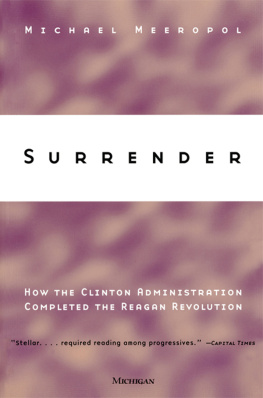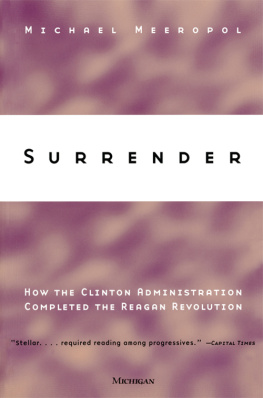Michael Meeropol - Surrender
Here you can read online Michael Meeropol - Surrender full text of the book (entire story) in english for free. Download pdf and epub, get meaning, cover and reviews about this ebook. year: 2018, publisher: The University of Michigan Press, genre: Politics. Description of the work, (preface) as well as reviews are available. Best literature library LitArk.com created for fans of good reading and offers a wide selection of genres:
Romance novel
Science fiction
Adventure
Detective
Science
History
Home and family
Prose
Art
Politics
Computer
Non-fiction
Religion
Business
Children
Humor
Choose a favorite category and find really read worthwhile books. Enjoy immersion in the world of imagination, feel the emotions of the characters or learn something new for yourself, make an fascinating discovery.
- Book:Surrender
- Author:
- Publisher:The University of Michigan Press
- Genre:
- Year:2018
- Rating:4 / 5
- Favourites:Add to favourites
- Your mark:
- 80
- 1
- 2
- 3
- 4
- 5
Surrender: summary, description and annotation
We offer to read an annotation, description, summary or preface (depends on what the author of the book "Surrender" wrote himself). If you haven't found the necessary information about the book — write in the comments, we will try to find it.
Surrender — read online for free the complete book (whole text) full work
Below is the text of the book, divided by pages. System saving the place of the last page read, allows you to conveniently read the book "Surrender" online for free, without having to search again every time where you left off. Put a bookmark, and you can go to the page where you finished reading at any time.
Font size:
Interval:
Bookmark:
 Page i
Page i Michael Meeropol
Ann Arbor
University of Michigan Press
Page iv Copyright by the University of Michigan 1998
All rights reserved
Published in the United States of America by
The University of Michigan Press
Manufactured in the United States of America
No part of this publication may be reproduced, stored in a retrieval system, or transmitted in any form or by any means, electronic, mechanical, or otherwise, without the written permission of the publisher.
A CIP catalog record for this book is available from the British Library.
Library of Congress Cataloging-in-Publication Data
Meeropol, Michael.
Surrender : how the Clinton administration completed the Reagan
revolution / Michael Meeropol.
p.cm.
Includes bibliographical references and index.
ISBN 0-472-10952-9 (cloth : acid-free paper)
1. United StatesEconomic policy19932. United
StatesEconomic policy19811993.3. Government spending
policyUnited States.4. BudgetUnited States.I. Title.
HC106.82.M431998
338.973'009'049dc2198-25387
CIP
ISBN 0-472-08676-6 (pbk.: alk. paper)
Grateful acknowledgment is made to the following authors, publishers, and journals for permission to reprint previously published materials.
M. E. Sharpe for excerpts from Beyond the Twin Deficits, A Trade Strategy for the 1990s by Robert Blecker. Copyright 1992.
Random House for excerpts from Day of Reckoning by Benjamin R. Friedman. Reprinted by permission of Random House, Inc. Copyright 1988 by Benjamin R. Friedman.
Simon & Schuster and George Borchardt for excerpts from The Seven Fat Years: And How to Do It Again by Robert L. Bartley. Copyright 1992 by Robert L. Bartley. Reprinted with the permission of The Free Press, a Division of Simon & Schuster.
St. Martins Press for excerpts from Budget Deficits and the US Economy: Considerations in a Heilbroner Mode, by Robert Pollin, in Economics as Worldly Philosophy, Essays in Political and Historical Economics in Honour of Robert L. Heilbroner, ed. Chatha and Nell Blackwell. Copyright 1993.
Timothy Smeeding for table from W(h)ither the Middle Class? by T. Smeeding, G. Duncan, and W. Rodgers, in Income Security Policy Series, Syracuse University (February 1992): 13.
Times Books for table from Restoring the Dream, ed. Stephen Moore. Copyright 1995.
Urban Institute Press for excerpts and tables from The Reagan Record by John L. Palmer and Isabel Sawhill, copyright 1984; for excerpt and tables from Is U.S. Income Inequality Really Growing? Sorting Out the Fairness Question, in Policy Bites by Isabel Sawhill and Mark Condon, copyright 1992; and for excerpts and table from The Tax Decade, How Taxes Came to Dominate the Public Agenda by Eugene Steurele, copyright 1992.
ISBN 0-472-12352-0 (ebook)
ISBN 0-472-90073-2 (Open Access)
doi: http://dx.doi.org/10.3998/mpub.15199
Page v To my wife, Ann
and to our children, Greg and Ivy
Page vi Page viiThey dubbed it the Goldilocks economy. Not too hotno apparent danger of inflation. Not too coldno increases in unemployment indicating a recession. The economy was just rightgrowing steadily. From 1997 through 1999, this was an accurate characterization of the U.S. economy. As the century drew to a close, the United States enjoyed the longest period of economic expansion in the postwar era. Despite some nervousness caused by the 1998 Asian and Russian economic crises, growth was rapid for both 1998 and 1999. Meanwhile, the prediction that the federal budget would be balanced by 2002 was proven hopelessly pessimistic. The August 1997 Balanced Budget Agreement between the president and Congress was followed by such rapid economic growth that the federal budget actually recorded a surplus in the fall of 1998, four years earlier than initially predicted. Squabbling over how to apportion the pain of budget cuts necessary to get Americas fiscal house in order now gave way to squabbles over how best to utilize the surplus. Predictably, the Republican majority in Congress wanted substantial tax cuts while President Clinton and the Democratic minority charged such actions would endanger the future of Social Security, Medicare, and all the other programs that needed to utilize the surplus.
Given all this good news, one might expect the title of this book to be Triumph: How the Clinton Administration Completed the Reagan Revolution and Paved the Way for Millennial Prosperity. However, as I wrote over two years ago, the short run, even four years worth, is insufficient evidence for an accurate analysis of recent economic policy. What were the results of the changes begun in the late 1970s and accelerated in the early 1980s which have come to be known as the Reagan Revolution? Are the current good times truly the result of the success of the Clinton administration, together with Congress, in transforming the budget deficits of the 1980s and early 1990s into surpluses at the end of the decade? Finally, are the current good times evidence of a Page x structural transformation of the American economy which will keep the good times coming? Have we, in fact, solidified the Goldilocks economy? To answer such questions we need to examine the history. We need a long-run perspective.
The experience of the past two years does not negate my analysis of the history of the Reagan Revolution and Clintons completion of that revolution. This edition contains an afterword that brings the analysis up to date. I invite the reader to engage with the evidence and arguments in this book.
Page xiIn a very real sense, everyone who has taught me economics and history has had a hand in the creation of this book. At Swarthmore College I benefited from the instruction of Joseph W. Conard, Frank Pierson, and William Brown in the Department of Economics and Jean Herskovits and Robert Bannister in the Department of History. At Cambridge University I was supervised by Robin L. Marris, Joan Robinson, and Bob Rowthorn of the Faculty of Economics. At the University of Wisconsin I had the pleasure of studying with economists Jeffrey G. Williamson, John Conlisk, William P. Glade, Peter Lindert, Rondo Cameron, and John Bowman, historians William A. Williams and Morton Rothstein, and Latin Americanist Maurice Zeitlin.
This book results from the research and writing I accomplished during a sabbatical in the 199495 academic year. However, my interest dates back to my first sabbatical, in 1980. For both sabbaticals, I want to acknowledge the institutional support of Western New En-gland College, where I have taught for over two decades. Part of my 1980 sabbatical was spent at Cambridge University. This gave me the opportunity to reflect about the gathering storm of conservative economic criticism of the United States government policies from the early 1960s through the end of the 1970s. When I resumed teaching, I was able to create a course on Reaganomics, which I taught from 1982 to 1989.
There are many people at Western New England College whom I want to thank. Student assistants Michelle Hinojosa and Andrea Higgins have been a tremendous help. Michelle has worked for three years tracking down materials, duplicating and inputting data, and Andrea has assisted this past year. The college duplicating-center staff, especially Sandy Mackin and Jim Garrison, have been efficient and cooperative throughout, even in the last-minute rushes to meet the publishers deadlines.
Font size:
Interval:
Bookmark:
Similar books «Surrender»
Look at similar books to Surrender. We have selected literature similar in name and meaning in the hope of providing readers with more options to find new, interesting, not yet read works.
Discussion, reviews of the book Surrender and just readers' own opinions. Leave your comments, write what you think about the work, its meaning or the main characters. Specify what exactly you liked and what you didn't like, and why you think so.












